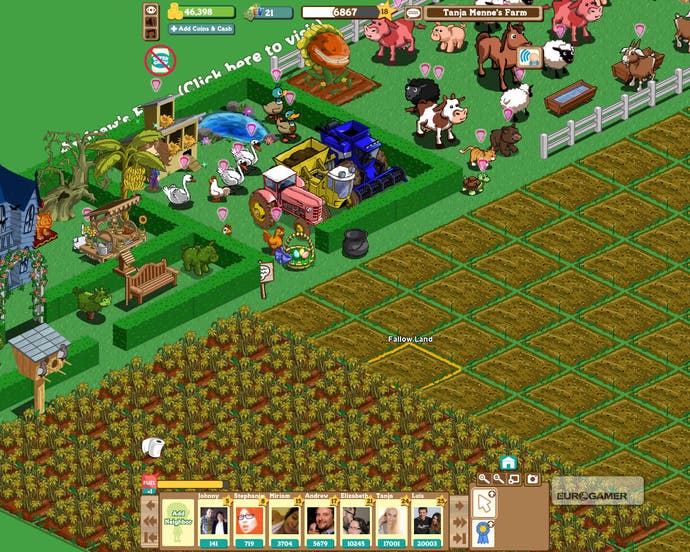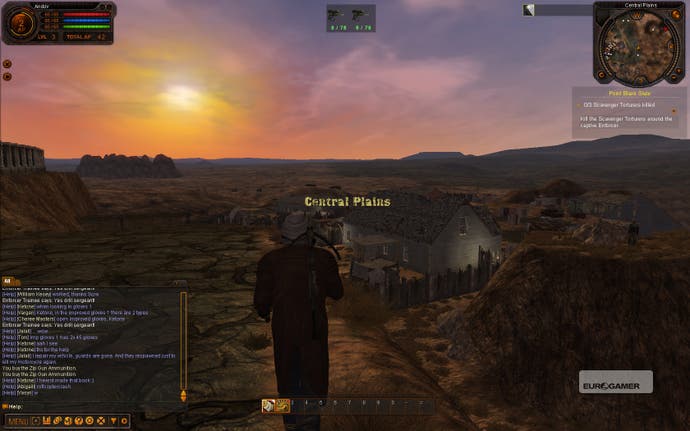The State of the MMO in 2010
When MMOs went west.
This topic came up when discussing the lo-fi, post-apocalyptic MMO Fallen Earth with its project manager, Colin Dwans. Fallen Earth has not quite suffered in the same way as these mega-projects, being a smaller, less ambitious, independently developed MMO, but it exists in the shadow of Blizzard's opus.
"We've definitely benefited from World Of Warcraft's success," says Dwans. "In a strictly business sense, people are more willing to take the MMO space seriously. They understand that if you are able to find loyal followers this can actually make money.
"From the audience perspective, well, I do believe that the vast majority of people come in, hit World of Warcraft, that's their niche, they've found it, they're going to stay there. But there will be a percentage that want something new. I've heard of people making the jump to EVE from WOW, and that's a game that is vastly more complex."
For the major publishers, of course, that confidence translates into attempting to replicate WOW's success, but it needn't go down like that. There is also scope for a smaller, iterative project to be grown from a small start: a project like Fallen Earth or, more famously, EVE Online. Games that are less approachable, more hardcore, have benefited from both punters and investors being more familiar with the idea.

"EVE requires familiarity with MMOs," says EVE Online producer Torfi Frans Olafsson. "We see that the large majority of our players are seeking refuge from other MMOs. They come to us after being let down by other games, and as such we don't consider World Of Warcraft or any of the other MMOs to be harsh competitors in that sense, because they often provide a training ground for people to move on to EVE." Olafsson's claims are backed up by the numbers: Eve Online grew 30 per cent in 2009, up to 320,000 subscribers.
The implication is fascinating: that World Of Warcraft was perhaps even more important for business confidence than it was for audience growth. Sure, there are people leaping off the WOW train into EVE and Fallen Earth, but none of the really big MMOs have bagged the market of millions that World Of Warcraft's subscriber base seems to suggest exists. Instead their markets are tens or hundreds of thousands - far closer to the numbers that the MMO world knew at the time when EverQuest and Asheron's Call dominated the landscape. The exodus from WOW is actually little more than a trickle, but when it's a tiny fraction of eleven million, smaller companies can still reap significant rewards.

To do so demands experimentation. The MMO template has been defined quite narrowly: experience points, quests, levelling up, fantasy lore. It makes sense for it to be built along these lines, because proven imaginative and mechanical models are a safe bet for both developers and publishers, but the truth is that there are lots of areas left to explore, in both form and content.
Fallen Earth, for example, has focused on a Fallout-style post-apocalypse, and immediately picked up a loyal following because of its subject matter. What Dwans' team couldn't do was aim for the millions of players the big fantasy MMOs had in mind. Instead, they started small and grew from there, a model that had already been proven by EVE Online: create the world and then start etching in the details over time.
This process has even moved outside of EVE itself, away from the PC, and onto consoles. CCP intend to create an FPS, DUST 514, to allow players to fight planetary battles on the consoles. They're moving into console development and action game production, while maintaining their connection to a networked, persistent community, a community that sticks around for years on end.








